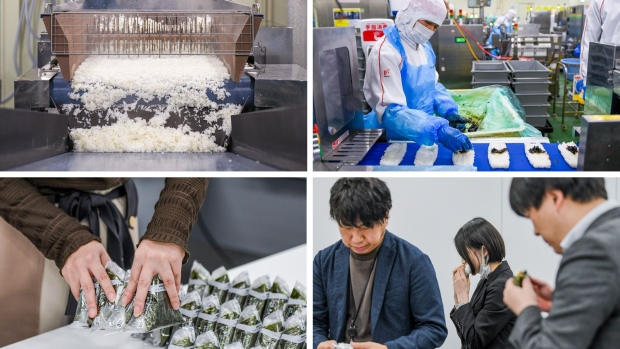Feb 6, 2024
Japan’s Convenience Stores Can Span the Globe, 7-Eleven CEO Says
, Bloomberg News

(Bloomberg) -- Ryuichi Isaka has spent more than $25 billion during the past few years to bolster an empire spanning 85,000 convenience stores, gasoline stations and retail outlets. But he wants more.
The chief executive officer of Japanese retailing giant Seven & i Holdings Co. believes that the formula behind the success of 7-Eleven — the Japanese version, that is — can be exported across the globe, potentially through acquisitions. “If there’s an opportunity, we’d proactively consider M&A,” Isaka said.
Although American in origin, the convenience store concept turned out to be transformational for the Japanese company, which fully took over the chain in 2005 in the US and embraced it as part of its name. Over the years, 7-Eleven evolved into a franchise that’s become part of the fabric of life in the island nation, offering affordable food, beverages and daily goods, as well as municipal and delivery services.
“We are in an industry that must continue to adapt to change in order to grow,” Isaka, 66, said in an interview with Bloomberg TV.
With an aging population at home, Seven & i has been seeking opportunities outside of Japan. While pushing to open 7-Eleven outlets across Asia, Isaka has taken a different approach in the US, where he orchestrated the acquisition of Speedway and Sunoco gasoline-station networks.
The CEO’s big bet: 7-Eleven’s know-how in making cheap, high-quality food will help to transform those chains into a new retail experience. One hint of the potential can be seen on YouTube, which is rife with clips extolling the virtues of egg-salad sandwiches and fried chicken from 7-Eleven, as well as its main rivals, FamilyMart and Lawson.
“We believe that we need to change our business model from one that relies on gasoline and cigarettes to one in which customers choose us based on our products,” Isaka said of the US market. “The key to this change is fresh food.”
Seven & i is working with supplier Warabeya Nichiyo Holdings Co. in the US to bring better products to stores, including sliders, ham-egg-and-cheese French toast, and chicken-salad sandwiches, according to Isaka. The goal is to create a supply chain that can deliver products everyday, while constantly evolving to reflect seasonal changes and demographics, like in Japan, he said.
At a recent product development meeting, 7-Eleven staff gathered to discuss flavors and textures of fillings for rice balls. Called onigiri, they’re one of the franchise’s most important products, with more than 2 billion sold each year. While seeking to balance quality with a recent rise in prices, they were seeking to replicate the taste of homemade riceballs, according to Nakyoung Kim, merchandiser of rice and noodle products at 7-Eleven Japan.
“We prioritize deliciousness,” Kim said. “We build our facilities and infrastructure for that, while developing products with high-quality ingredients.”
There’s also an opportunity to pursue acquisitions to consolidate the fragmented US market, according to Isaka. The top 10 convenience store chains in the US make up only about a fifth of the entire market, with 7-Eleven’s share at only 8.3%, underscoring that there’s further room to grow, according to the company. By comparison, Seven & i, FamilyMart Co. and Lawson Inc. make up 93% of the Japanese market.
Now in 20 countries and regions, Isaka is seeking to add 10 more by fiscal 2030. In Europe, Seven & i is in discussions with “several companies” to find partners, he added.
ValueAct Capital Management, an activist investor, agrees that the company’s greatest potential lies in its convenience-store business.
Where the investor and Seven & i’s management differ, however, is on how to unlock greater value. ValueAct is pushing the retailer to split off its other operations, which span multiple business areas — including its original Ito Yokado general stores, Denny’s Japan restaurants and a successful banking network. Last year, Seven & i finalized the sale of its Sogo & Seibu Co. department store chain to Fortress Investment Group at an enterprise value of about ¥220 billion.
When asked about the investor’s assertions, Isaka said they’re not limited to ValueAct, because he’s heard similar comments from other shareholders. Breaking up the group would risk destroying shareholder value, Seven & i has said, pushing back against the investor’s demands. In response last year, ValueAct sought to replace Isaka and other board members with its own candidates, but failed.
“What we are explaining is that if we are to transfer the growth of 7-Eleven Japan to the rest of the world, we must transfer the success of 7-Eleven Japan’s food business as well,” Isaka said. “If we simply increase the number of stores, we will be building a tower on a very weak foundation.”
Even so, investors haven’t been impressed. Seven & i’s shares hardly budged in 2023, despite a ¥200 billion share buyback plan announced in October, the first in 13 years. Over the same period, the benchmark Topix Index jumped 25%. So far this year, stock is up about 9%.
The retailer traces its origins back to the Yokado Clothing Store, founded in Tokyo in 1920. Isaka took the helm in 2016, with the backing of another activist investor Daniel Loeb, founder of Third Point LLC, after a boardroom struggle with the prior CEO. Isaka says his favorite 7-Eleven products include its ¥110 coffee and a herb-flavored rice cake called kusamochi.
“We want to create a store where customers are motivated to come because of our offerings of fresh food, original beverages at the counter and private brand items,” Isaka said.
--With assistance from Grace Huang.
©2024 Bloomberg L.P.






